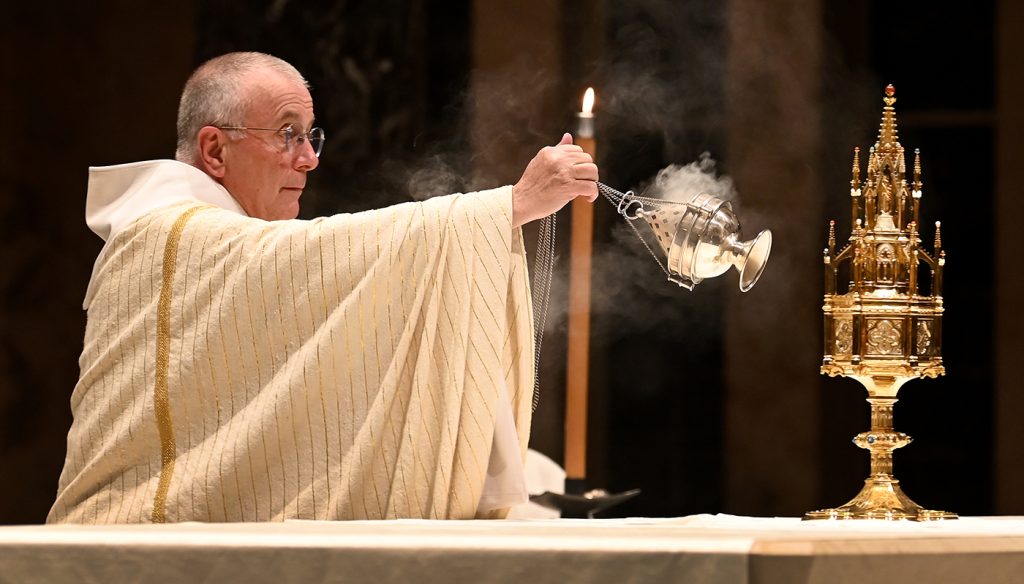Norbertine Life


Five key pillars underlie our experience of community

The Five Pillars are shown in the Prime Window at St. Norbert Abbey Church.
To learn more about Norbertine Life, please contact Vocation Director Fr. Johnathan Turba, O. Praem., at 920-337-4333 or vocations@norbertines.org.
The Norbertine Order is rooted in the Gospel of Jesus Christ and the Rule of St. Augustine, which calls Norbertines to be of “one heart and one mind on the way to God.” Norbertine community life is characterized by the power of the Holy Spirit and a desire to be of service to God’s People. Neither monks nor diocesan priests, Norbertines collaborate in common ministry to the local Church while living in community.
The Five Pillars of the Norbertine Order are fundamental to the Norbertine experience and to the continuing development of community within all Norbertine houses and apostolates. These Pillars can be found in the Directorium Spirituale of the Order (promulgated in 1959). The Five Pillars are:
Devotion to the Blessed Sacrament
(Cultus Eucharisticus)
St. Norbert is known in the Church as the defender of the Eucharist because at a time when daily celebrations of Mass were uncommon, he would celebrate Mass at least once a day. He is also remembered for defending the Eucharistic against the heresy of Tanchelm. Norbertines are urged by St. Norbert to practice a “cleanliness around the altar” and ensure great care and devotion is taken when celebrating the Mass and in the presence of the Lord in the Eucharist.
Devotion to the Blessed Virgin Mary
(Cultus Marianus)
While Marian devotion is not unique to our Order, there is a long history of Marian devotion and influence. In his own time, St. Norbert wished to entrust every house to Our Lady and he wanted the Order to claim her as Patroness and Protector of the Order; the Order honors her as such on August 15, the Solemnity of the Assumption. One of the great mystics of our Order, St. Herman Joseph, composed many prayers, prose, and poems to our Lady. Today, beyond our own private Marian devotions, we sing a particular antiphon or hymn to Mary every night to conclude Vespers.
Zeal for Souls
(Zelus animarum)
After his conversion, St. Norbert was a zealous reformer and he wanted all to experience the joy of being united with the Lord. As he helped establish the foundations of the Canons Regular, St. Norbert imbued his Order with a sense of both action and contemplation. The canon should have a heart like Christ’s that seeks out the lost sheep and also finds rest and deep communion with the Lord in contemplative prayer with his confreres. The autonomy of each house in the Order lives out our motto to be “prepared for every good work” so that we can be of service to the local church and the local needs.
Spirit of Habitual Penance
(Spiritus iugis penitentiae)
The Lord tells us, “Take my yoke upon you. Learn from me for I am humble of heart.” (Mt 11:29). Our spirituality impels us to live a life of daily conversion. Being lived out, daily conversion looks like making little sacrifices with great love. Another way is practicing peace and reconciliation, or living with a sense of forgiveness for others reminds us of how much we are in need of forgiveness from the Lord.
Praise of God in Choir
(Laus Dei in Choro)
The Rule of St. Augustine directs us to “be zealous in prayer at the times appointed” (Ch. 2, no 10), and “when you pray to God in psalms and hymns, ponder in your heart what your lips are saying” (Ch. 2, no 12). The daily gathering together to sing God’s praises in choir at the Liturgy of the Hours is a place of encounter with the Lord and with the happenings in our lives. It’s the place where action and contemplation meet. When the community gathers together to pray in unison and harmony, our canonical life becomes a gift we receive from the Lord and a gift we are then missioned to give to one another and the People of God to whom we minister.

